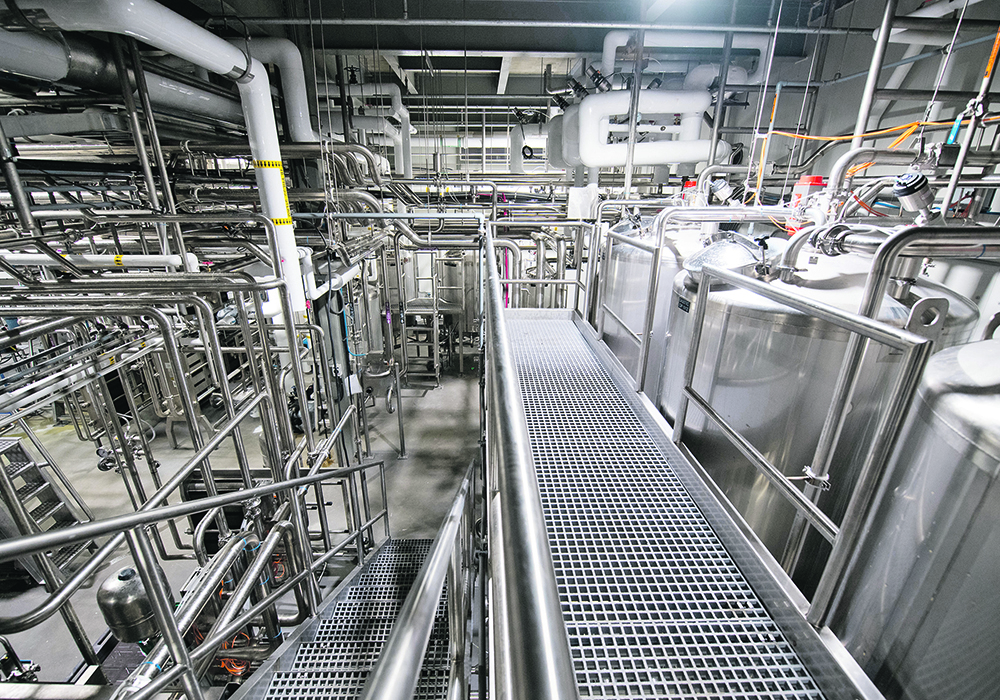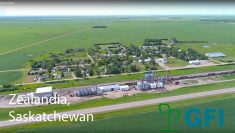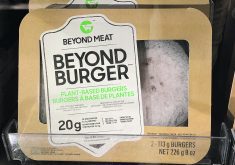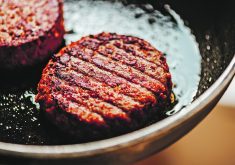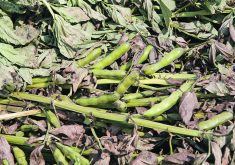The company pioneers the commercial food use of canola protein isolates at the facility it has just built in Winnipeg
The air is filled with the buzz and whine of industrial white noise that forces everybody here to wear noise-deafening earmuffs, but the plant is open and spacious.
There’s lots of room around the gleaming stainless-steel pipes and processors, across the metal grate floors and stairs and under the high ceilings that form the home of the world’s only canola meal protein plant.
It might not always be so spacious. The excess room here today is due to the builders of Merit Functional Foods giving themselves the ability to quickly double the plant’s capacity. If demand for the company’s canola and pea protein products takes off as much as it hopes, it can not only double every bit of processing installed in the facility today, but also add an extension of equal size, quadrupling production.
Read Also

Fusarium head blight mycotoxin detector in the works
A PhD student at the University of Saskatchewan has been working on developing a method of detecting fusarium damaged kernels to ease the struggles of producers, agronomists and industry.
“In 24 months, this went from a piece of land to producing commercial protein,” said Dan Kraft, Merit’s vice-president for operations, as he toured a reporter through the company’s operation in northwest Winnipeg.
“We anticipate to grow to four times the size.”
While that might have seemed like a bold projection two years ago, Merit’s gamble on booming demand for plant protein products is proving to have been prescient. Plant protein has become the most talked-about story in the food and nutrition industries in years, and this company is finding numerous customers for its products, which are now being used in a dozen countries.
The company processes pea protein for meat substitutes and milk products, among other uses, as do other plant protein companies. But it is also pioneering the commercial food use of canola protein isolates, which is unique.
It uses a “wet process,” in which canola meal is turned into a slurry so that specific protein fractions can be extracted, to produce its dried protein products.
It is working with food companies to demonstrate the possibilities for canola protein, which are distinct from pea protein’s potential.
“They’re very different proteins in terms of their applications,” said Kraft, cloaked in a white smock and wearing a hairnet, a hard hat, a face mask (not just for COVID-19), and steel-toed boots.
Merit sources canola and peas from farmers. To meet its specifications, farmers must grow only non-GM canola, eschew glyphosate and grow the crop in fields that haven’t had glutenous (wheat) or soybean crops prior to the protein crop.
The company has the crop picked up, has it cleaned, then brings it to the facility’s grounds. Each farmer’s load of about 160 tonnes is stored individually. Each of those “lots” is brought one at a time into the plant, generally one lot per day, cleaned again and then put through the processing system.
“We have complete traceability back to the farm,” said Kraft.
The pea and canola processing lines are similar but have some key differences. Being an oilseed, the canola is cold pressed, the oil removed and the meal sent through the wet extraction process. The oil is shunted off and sold as a by-product, reversing the usual oil-focused bias, in which the meal is the byproduct.
Peas are first dehulled, then milled, then wet-processed and broken into protein fractions.
The pea fibre ends up being sold as feed. Much of it now sits in rotund 800-kilogram totes that squat like meditating sumo wrestlers on pallets placed on high shelves. The shelves also hold pallets of bagged protein products from peas and canola, as well as physically smaller but equally heavy totes of protein extractions.
These products will all be trucked out. With such high-value products going many directions, train transportation doesn’t make sense. Merit’s plant is well situated for easy trucking east, west and south to the United States.
It is one of the first residents of Winnipeg’s new inland port, known as CentrePort Canada, which is bringing together transportation, warehousing and processing in an area already housing the province’s trucking industry and the city’s international airport.
The plant has been easing toward full production for months. On this day in late 2021 it was going to process about 60 tonnes of seed, which is about 80 percent of what is hoped to be full capacity with present equipment.
The working-in process has gone well, considering that construction was carried out during a pandemic that kept the engineers and designers, mostly from the U.S., from visiting the site, and in which sophisticated European machinery, mostly from Germany, had to be brought in and installed, while COVID-19 restrictions were in place.
“A lot of our key design people couldn’t be here,” said Kraft.
It’s still a work in progress. On this day blue-smocked tradesmen could be found installing and tweaking various components, while engineers thought about how various systems could be refined.
It’s a quickly evolving plant, and as it goes into full production it is meeting a world plant protein market that is only slowly revealing its true size and scope.
The plant and the market face years of tweaks and adjustments, but now that this facility is built, it’s a canola and pea protein reality that is unlikely to go away any time soon.


